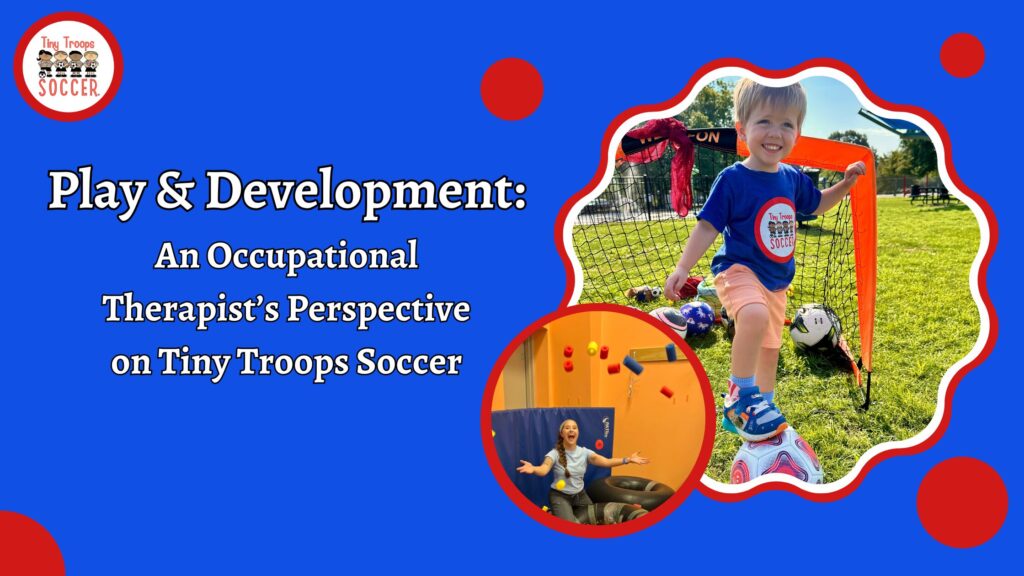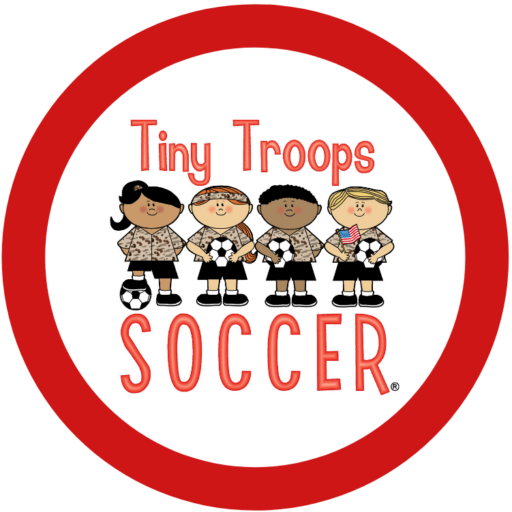Play & Development: An Occupational Therapist’s Perspective on Tiny Troops Soccer
Home » Play & Development: An Occupational Therapist’s Perspective on Tiny Troops Soccer

As parents, we’re always looking for ways to help our little ones grow and develop. Programs like Tiny Troops Soccer are more than just sports programs; they are a way for young children practice key developmental skills that will benefit them as they grow. We took some time to speak with Sarah Dachille, an Occupational Therapist, to explore the benefits of Tiny Troops Soccer on your child’s development.
The Benefits of a Developmental Sports Program
Sarah says, “A developmental sports program like Tiny Troops is a fun way for kids to learn many skills that are important as they grow. These skills include physical, emotional, and social skills, which are crucial for success in everyday activities like self-care, play, eating, academics, behavior, and leisure.”
Tiny Troops Soccer allows children to develop these skills through structured, play-based activities. Each of our coaches is provided with a lesson plan that builds these skills into every class.
Areas of development include:
- Gross Motor Skills – Running, jumping, balancing, and kicking
- Social Skills – Taking turns, following directions, and playing with coaches and other players
- Emotional Growth – Building confidence, learning patience, and persevering to practice new skills
Why Practicing Social and Emotional Skills in a Sports Setting is Beneficial
Sarah emphasized, “The biggest benefit in sports is kids can learn these skills through play, which makes it fun. Tiny Troops uses fun and engaging games to teach different skills to all age groups. The coaches also use their personalities to motivate kids throughout classes.”
Participating in a structured, yet fun environment allows children to:
- Develop emotional regulation skills (handling frustration, excitement, and transitions).
- Learn teamwork and cooperation with other players.
- Build confidence as they master new skills.
- Improve listening skills and the ability to follow multi-step directions.
- Learn to persevere by practicing difficult skills over and over again
How to Build on These Skills at Home
Reinforce your child’s learning with simple activities at home. Many daily routines naturally support the same skills needed for soccer and overall development. Sarah shared practical activities that families can incorporate into existing routines.
Daily Routines that Build Coordination & Body Awareness
- Dressing: Allow your child to put on their pants. This lets them practice balancing on one leg without falling, a skill found in soccer techniques like trapping the ball or doing toe taps.
- Labeling Body Parts: Name body parts while getting dressed or undressed. Body awareness is crucial for soccer, as kids need to understand the difference between using their hands and feet.
- Bathing: Let your child practice getting in and out of the bathtub (with adult supervision). This task requires balance and coordination
- Grooming: Turn washing into a game! Say, ‘Hmm, I’m going to wash your _____,’ and let your child fill in the blank. This builds body awareness and decision-making skills.
- Navigating Obstacles: Encourage your child to move around objects at home—like stepping over toys or weaving through furniture. Or take the fun outside and create your own obstacle courses. This improves agility and spatial awareness.
More Fun Activities to Enhance Tiny Troops Soccer Skills
Outside of daily routines, there are many fun and active ways to build on the skills your child is developing in their soccer classes:
- Move Like Different Animals – Bear crawls, crab walks, and frog jumps improve strength, coordination, and body awareness.
- Bubbles – Have your child pop bubbles using only their feet! This reinforces foot-eye coordination
- Chase and Tag Games – Running and changing direction helps build agility and stamina.
- Goal Practice – Set up a simple goal (like a laundry basket) and encourage your child to kick the ball toward it to improve accuracy and control.
Final Thoughts
A program like Tiny Troops Soccer is a wonderful way to help your child develop physical, social, and emotional skills in a fun and supportive environment. By incorporating simple activities into your daily routine on and off the field, you can reinforce these skills and help your child continue to grow in confidence, coordination, and teamwork.
Sarah’s advice? “The most important thing is to keep it fun! When children are enjoying themselves, they’re learning in the best way possible.”
Sarah Dacchille is a registered and licensed occupational therapist from North Carolina. She specializes in pediatrics with specific interests in sensory integration and feeding. Sarah loves to use play to motivate kids to learn new skills, so they can be functional in their lives. Kids learn through play in order to develop the skills they need to be functional in their lives. Sarah currently resides with her husband and dogs in Boone, NC. She works at Wildwood Therapy, a pediatric outpatient clinic.


